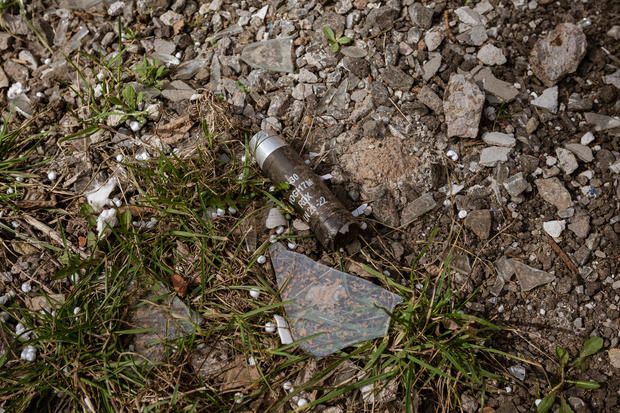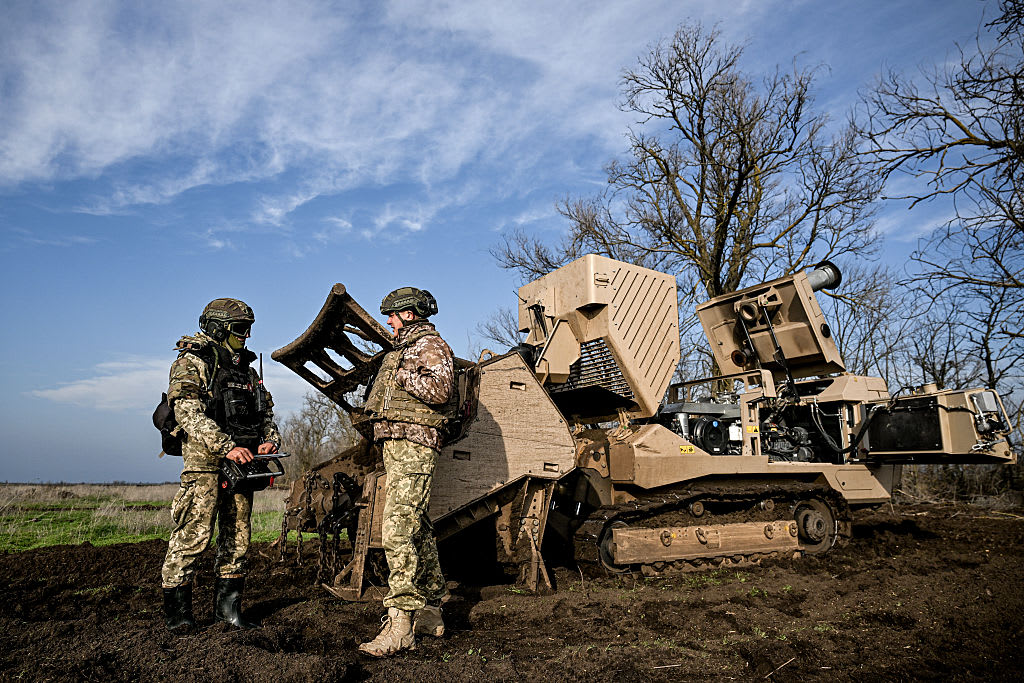What is a cluster bomb, the controversial weapon the U.S. is sending to Ukraine?
The Biden administration announced Friday that a new weapons package for Ukraine will include cluster bombs — a controversial type of weapon the U.S. has not provided to the country before. Specifically, the package will include 155mm DPICMs, which stands for dual-purpose improved conventional munitions.
What is a cluster bomb?
A cluster bomb is a type of weapon that is designed to disperse smaller bombs over a large area. They are also known as cluster munitions, with the smaller bombs referred to as submunitions or bomblets.
Cluster bombs can be dropped from the air or shot from the ground or sea, and the dozens or hundreds of bomblets they release can disperse over a large area. They were first used in World War II for the purpose of destroying multiple dispersed military targets or combatants.
Any people in that area at the time a cluster bomb is detonated could be killed or seriously hurt. Beyond that, many of the bomblets fail to explode immediately, meaning they can injure or kill people years later.
Why are cluster bombs controversial?
A significant number of bomblets do not explode on first impact as intended. According to the International Committee of the Red Cross, the submunition failure rate — referred to as the "dud rate" — has varied from 10% to 40% in recent conflicts.
"Large-scale use of these weapons has resulted in countries and regions being infested with tens of thousands, and sometimes millions, of unexploded and highly unstable submunitions," the organization said.
In addition to posing an immediate threat to civilians living in areas where cluster munitions are used, the bomblets that remain unexploded are small, can have interesting shapes, and can be colorful, meaning those that don't immediately detonate can appear like toys to children, who might try to pick them up and be maimed or killed.
Civilians are the primary victims of cluster bombs, according to the Landmine and Cluster Munitions Monitor, a group that does research on behalf of the International Campaign to Ban Landmines-Cluster Munitions Coalition. In 2021, the latest year for which data was published, the group said that of 141 casualties from cluster bomb remnants, 97% were civilians, and two-thirds of those were children.
"It is a terrible reminder of the dire need for rapid clearance of contaminated areas, age-appropriate education on the risks of unexploded bomblets, and greater dedicated support to the victims and their families," Loren Persi, editor of the Cluster Munition Monitor 2022 report, said in a statement.
Are cluster bombs banned?
One hundred and twenty-three countries have joined the 2008 Convention on Cluster Munitions, an international treaty which entered into force in 2010. The convention bans the production, transfer, stockpiling and use of cluster munitions in all circumstances and requires relevant states to implement victim assistance measures.
Neither Russia, Ukraine, nor the United States are signatories or state parties to the convention. Cluster bombs have been used extensively in the Gulf War, Chechnya, Afghanistan and Iraq.
Cluster bombs in Ukraine
A variety of cluster bombs have been used by Russia on the battlefield in Ukraine, both against Ukrainian troops and in urban areas, Sidharth Kaushal, a research fellow at the defense and security think tank RUSI, told CBS News. He said Ukraine also has a limited number of cluster munitions from Turkey.
"Cluster munitions are especially useful for clearing out large numbers of infantry," Kaushal said. "Given Russia's shift towards combining limited numbers of skilled assault troops with larger numbers of expendable 'Storm Z' units, the ability to engage and destroy large concentrations effectively is important to the Ukrainians. They can also be used against armor, and to attack fixed positions more effectively."
Kaushal said cluster bombs would help Ukrainian troops in multiple ways as they fight against Russia's invasion.
"They are a force multiplier for the Ukrainian artillery in both offensive roles and defenses against local Russian counterattacks," Kaushal said.
Despite their potential effectiveness on the battlefield, the U.S. has been reluctant to provide cluster munitions to Ukraine.
"Our military analysts have confirmed that DPICMs [cluster bombs] would be useful, especially against dug-in Russian positions on the battlefield," Laura Cooper, the U.S. deputy assistant secretary of defense for Russia, Ukraine and Eurasia, said during congressional testimony earlier this summer.
"The reason why you have not seen a move forward in providing this capability relates both to the existing Congressional restrictions on the provision of DPICMs and concerns about allied unity," Cooper said.
Many of the states party to the 2008 Convention on Cluster Munitions are NATO allies.
"NATO as an Alliance does not have a position on the Convention on Cluster Munitions, because a number of Allies have signed the convention but a number of Allies have not signed the convention," NATO Secretary General Jens Stoltenberg said Friday. "It is for individual Allies to make decisions on the delivery of weapons and military supplies to Ukraine."
Lower "dud rate"?
The "dud rate" of the weapons the U.S. is preparing to send to Ukraine is less than 2.35%, Pentagon press secretary Brig. Gen. Patrick Ryder told reporters on Thursday.
U.S. law currently restricts the transfer of cluster munitions if the "dud rate" is over 1%, meaning President Biden may waive the requirement.
"We would be carefully selecting rounds with lower dud rates for which we have recent testing data," Ryder said, adding that Russia had already been using cluster munitions in Ukraine that reportedly have significantly higher dud rates.
Eleanor Watson contributed to this report




